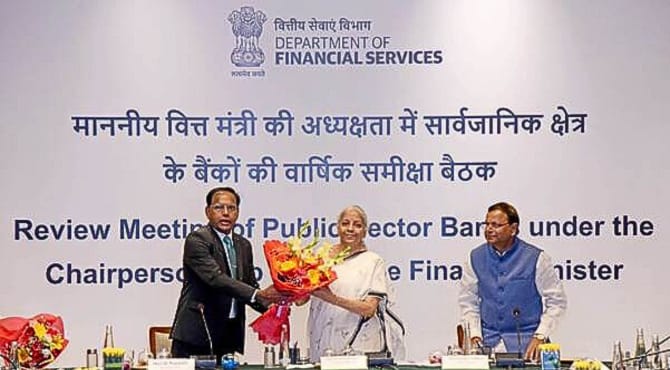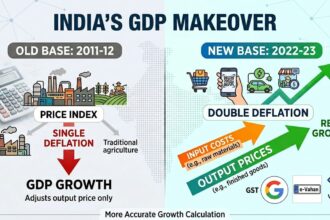Finance Minister Nirmala Sitharaman has addressed a major issue that was raised by the idea of privatising public sector banks (PSBs) – whether such a move could negatively impact financial inclusion in India. At the Delhi School of Economics, she said that the notion that privatisation would hinder financial inclusion was a misconception and went on to assert that professionalising banks has, in fact, led to the attainment of these goals.
For the most part of the last 50 years, public banks have been the pillars of India’s money system, and after the banks’ nationalization in 1969, the government kept its control. The intention of the move was to increase access to banking and push priority sector lending, which consists of sectors like agriculture and small businesses. Nevertheless, Sitharaman noted that even after half a century of nationalisation, targets for financial inclusion had not been entirely met. She explained that government control frequently resulted in a lack of professionalism in banks, which in turn caused inefficiencies and the need for repeated capital infusion by the government.
Sitharaman highlighted the changes’ good effects when in recent years banks were made to function professionally with decisions taken by the board. She mentioned that these reforms had resulted in a strengthened banking sector with improved asset quality, net interest margins, and credit growth. The positive changes, at the same time, are beneficial for financial inclusion goals and the national interest. In her view, the idea that privatisation will lead to less effort in taking banking to every layer of the society is a fallacy since professional governance enables banks to achieve all goals more effectively.
She remembered the “twin balance sheet problem” that was burdening Indian banks around 2012-13 and taking a lot of time, and effort from the government and regulators to solve it after Prime Minister Narendra Modi came to power. Presently, she argued with confidence, Indian banks are doing better than most of the other global banks and have made great strides in both financial inclusion and asset quality.
Sitharaman’s statement is in line with the government’s ongoing work to strengthen and clean up the banking sector which includes privatizing some PSBs. The government has already divested its controlling stake in IDBI Bank to Life Insurance Corporation and is plotting further strategic sales in a systematic way. By pointing out that granting operational freedom to banks and reducing direct government control makes these institutions more efficient and more capable of achieving both commercial and social goals, she underlined the bank reforms’ objective most clearly.
During this occasion, Sitharaman also deliberated on the Indian economy’s stability and its position in the world. She declared that India’s large population and economic might are still major assets in spite of external pressure, and these factors put India in a good stead to defend its interests at the global level. One of the reasons for such confidence, according to her, is the tremendous progress India has made in lifting millions of its people out of poverty and becoming one of the largest economies in the world.
The finance minister additionally brought to attention the recent reforms implemented such as the simplification of GST and made an announcement about the ongoing work directed at the modernization of customs duties that will be included as a part of India’s comprehensive economic reform plan. She also confirmed the government’s promise to keep fiscal discipline by setting a target for the fiscal deficit at 4.4 percent for the coming financial year, and then moving the focus to controlling the debt-to-GDP ratio. Such a financially prudent policy is instrumental in the bigger picture of a developed India by 2047.
Finally, Finance Minister Sitharaman argued that the privatisation of PSBs is not contrary to the goal of financial inclusion. Rather, the professionalisation of banks and their being allowed board-driven decision-making is more in line with India’s economic and social objectives. Financial inclusion is not merely a matter of government ownership, but effective and sustainable banking services have to reach every citizen. According to her, the strides made over the last ten years stand as evidence that a professional and well-managed banking sector – be it public, private, or a mix of both – will be India’s forte in the future.
This represents a well-defined and practical position of the government on banking reforms, which is indicative of the persistent endeavors to fortify India’s financial system while at the same time making sure that the provision of inclusive growth is still on target.









